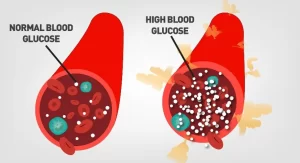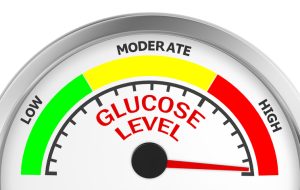MaxLiving Perspectives: Incorporating the 5 Essentials
High blood sugar, clinically called hyperglycemia, can impact people with both type 1 and type 2 diabetes.
There are 2 types. Fasting hyperglycemia is blood sugar higher than 130 milligrams per deciliter (mg/dL) after
not eating or drinking for at least 8 hours.
Postprandial hyperglycemia occurs when blood sugar higher than
180 mg/dL 2 hours after you eat.
Frequent or ongoing high blood sugar can damage your nerves, blood vessels, and organs while leading to
other serious complications.
Numerous studies show untreated hyperglycemia shortens lifespan and worsens
the quality of life.
Talk with your doctor about these and other strategies to normalize blood sugar levels.
Work with your chiropractor to better manage high blood sugar.
• The central nervous system, which controls your endocrine glands that secrete key hormones like
insulin, plays a key regulatory role in blood sugar balance.
Chiropractic care benefits both type
1 and 2 diabetes, which play a role in other chronic inflammatory conditions.
Researchers found
stimulating the nervous system in diabetic mice reversed their condition. (“Mice with Diabetes
suddenly didn’t have Diabetes anymore.”) Other research shows that type 2 diabetes may have a
central nervous system etiology and that microvascular decompression in the area of the brainstem
could be an effective treatment.
• A chiropractor can also create an individualized dietary and lifestyle protocol that complements
your doctor’s approach.
Nutrition
Follow the MaxLiving Advanced Nutrition Plan, which provides the correct amounts of healthy fat,
protein, and nutrient-dense carbohydrates to stabilize blood sugar levels.
• Maintain a healthy weight. Talk with your doctor about strategies to help lose weight or gain weight
healthily.
• Avoid smoking and alcohol.
• Avoid sugar and refined carbohydrates including whole grain crackers, pasta, and bread that can
create or exacerbate high blood sugar.
For some people, even healthy foods including fruit can adversely impact blood sugar.
Talk with
your doctor about finding a diet that works for your condition.
• Gluten and other food sensitivities can create blood sugar imbalances.
Consider working with
a chiropractor or other healthcare professional with an elimination diet to see if your symptoms
improve.
• Drink at least 8 glasses of clean, filtered water daily. Green tea can also help manage healthy blood
sugar levels.
• Aim for at least 35 – 50 grams of fiber (gradually increase intake) to stabilize blood sugar levels from
fruits, vegetables, nuts, and seeds daily.
• Stabilize blood sugar levels by eating consistent meals and snacks containing protein, healthy fats,
and dietary fiber. Please note: Everyone’s metabolism will be different. Work with your healthcare
professional to develop an optimal plan to modify your eating pattern and keep blood sugar levels
steady throughout the day. MaxLiving’s Essential Bar makes the perfect snack, with healthy fat and
protein, with provides 6 grams of fiber in each bar.
• Cinnamon can help reduce symptoms of metabolic syndrome including insulin resistance.
• Get adequate amounts of omega-3 fatty acids from cold-water, wild-caught fish, grass-fed meats,
walnuts, and hemp and chia seeds.
• Avoid damaged fats and oils including vegetable oils, hydrogenated oils, and trans fats. Instead,
opt for fats and oils rich in healthy fats including extra-virgin olive and coconut oils.
• If you need a sweetener, use stevia or xylitol in small amounts.
Mindset
Minimize stress and learn strategies to manage stress. Research shows stress contributes to poor
blood sugar control because chronic stress can create hormonal imbalances that impact blood
sugar, including insulin and cortisol.
• Get 8 – 9 hours of sleep. Insufficient and/or poor-quality sleep can adversely impact glycemic
control and insulin levels.
• Communicate with your doctor about signs and symptoms of high blood sugar that could signify
pre-diabetes or diabetes, including fatigue, blurred vision, frequent urination, and excessive thirst
Oxygen & Exercise
High-intensity, short-duration exercise 3 – 4 times a week can positively impact blood sugar levels
by helping balance insulin, cortisol, and other hormones that modulate glycemic control.
Minimize Toxins
Use only toxin-free beauty and cleaning products. Research shows heavy metals and other toxins
including mercury can adversely impact blood sugar levels and contribute to problems including
diabetes.
Supplements
*Discuss modifying doses of these supplements and including any additional supplements to benefit your health with your doctor*
| MaxLiving Supplements | Time of Day |
| Men’s and Women’s Multivitamin | 1 capsule twice daily with food |
| Vitamin D3 + Probiotics | 1 capsule daily with food |
| Optimal Omega | 2 soft gels 1-2 times daily with food |
| Max GI | 2 capsules before meals |
| Max Fit | 1 capsule before each meal |
| Max Greens | 1 serving a day with water (follow directions) |
| Pro Magnesium Formula | 1 teaspoon daily (take before bed for calming benefits) |
| Detox System | Cell Detox: 2 capsules daily, 30 minutes before a meal Body Detox: 2 capsules daily, one hour before bedtime |


